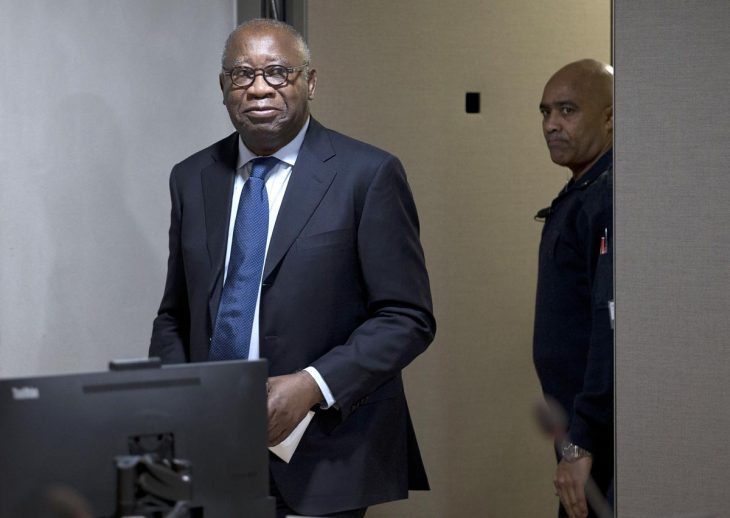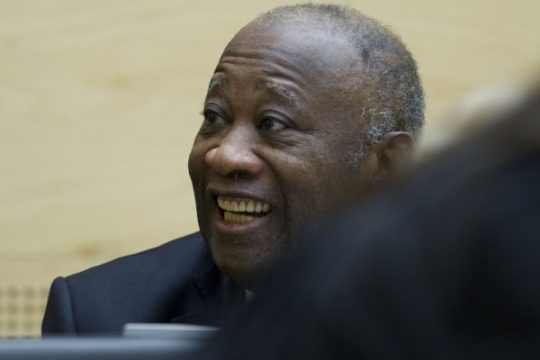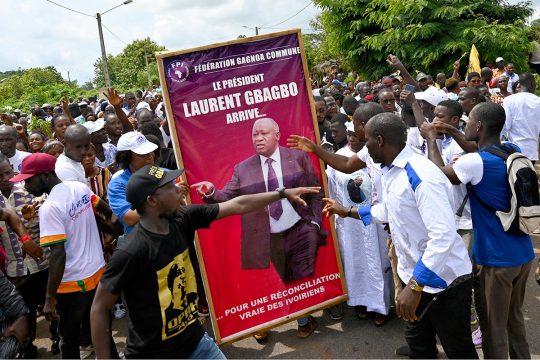The trial of former Ivorian leader Laurent Gbagbo and his so-called ‘Street general’ Charles Blé Goudé before the International Criminal Court (ICC) will resume next week to examine the request of the defence to declare that there is ‘no case to answer’ and acquit both accused. The prosecution insists that they have a strong case but people who follow the trial closely question if the prosecution’s much vaunted insider witnesses have done enough to link the former president to the crimes committed. The fact that the judges agreed to hear the ‘no case to answer’ motion may indicate that the judges are not convinced either.
And this is not the only sign. The prosecution ended the presentation of its evidence in January this year. In an unusual step the judges then asked chief prosecutor Fatou Bensouda to file a “mid-trial brief” focusing on the evidence submitted to support the charges laid out in the pre-trial prosecution brief.
“The fact that presiding judge Cuno Tarfusser essentially asked the prosecutor to clarify her scenario suggests that the judges are not too sure what the prosecution’s story for this case is,” said Thijs Bouwknegt, assistant professor of the University of Amsterdam who has followed the trial closely.
The “farfetched” scenario of a common plan
It is in reaction to the mid-trial brief that in April the defence filed a ‘no case to answer’ motion. Such a request is a bit of an anomaly in international tribunals. In a 2016 article Ady Niv – then a legal officer at the Yugoslav international tribunal – argued that such motions make sense in common law where judges are only triers of law while the jury are the triers of fact. But at international tribunals like the ICC judges take both roles.
Indeed, there is no provision for such motion in the ICC rules of procedure. Some trial chambers have allowed it, like the judges in the Gbagbo trial and those in the Ruto and Sang case over Kenyan election violence. Others, as in the ongoing case against Ugandan rebel commander Dominic Ongwen, denied it and ordered the defence to present its case. ICC judges have only few precedents to look at and those are often open for several interpretations. “Every situation at the ICC is different and trials are kind of mini-tribunals on to themselves,” said Bouwknegt.
According to Gbagbo’s defence the prosecution has not proven beyond a reasonable doubt that there was a “common plan” in the close-knit circle around Gbagbo to use violence to cling to power. “It is a farfetched scenario where Ggagbo and Blé Goudé and others made a pact in October 2000 to stay in power “by all means” and then, over ten years later, use violence (after the elections) to further this common plan,” said Bouwknegt.
The prosecution did get quite a few high-ranking military and police officials to come and testify in The Hague, and it made much of these insider witnesses. But they all came assisted by their own lawyers and seemingly wary of implicating themselves, and thus Gbagbo in any crime. “A real link is hard to establish. The trial does not seem to have established, beyond a reasonable doubt, a direct line from the soldiers on the ground to Gbagbo,” said Bouwknegt. “Having many insider witnesses alone is not enough, it also depends on what they say.”
An implosion in slow motion?
The defence insists Gbagbo was merely carrying out his tasks as president and instructed the army and security forces to deal with armed rebels and did not overstep his power in doing so. For Blé Goudé the prosecution even conceded it had not proven two counts in the indictment and suggested they be removed. However, the bulk of the charges should stay, they told judges at a hearing this month.
So are we watching the implosion of the Gbagbo trial in slow motion? Judges are trying to keep a close rein on the case but it has taken ten months to get from the end of the prosecution case to this ‘no case to answer’ hearing. A decision could be months off.
The pressure on the tribunal to have this case be a success for the prosecution is enormous. Gbagbo, a former head of state, is the highest-ranking accused to ever be on trial before the ICC. In 2014 the prosecution was forced to withdraw the charges against the only sitting head of state ever to appear in the dock at the ICC, Kenya’s president Uhuru Kenyatta. Sixteen years in existence the court has only carried three convictions for the court’s core crimes, all of them for relatively minor figures – two militia commanders from the Democratic Republic of Congo and an Islamist from Mali.
Gbagbo’s trial follows the acquittal on appeal of Congolese former vice-president Jean-Pierre Bemba in June this year. And the ICC has no major trial due to start any time soon. “It will be very bad for the court if the Gbagbo case collapses,” said Bouwknegt.








